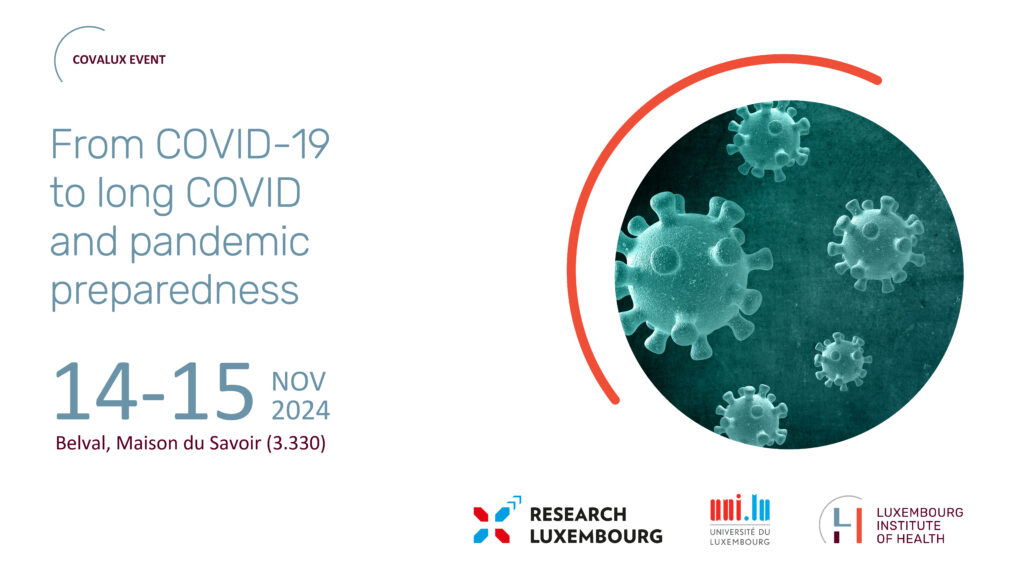News
Reflecting on CoVaLux 2024: Bridging Science and Preparation for a Post-Pandemic World
- Events
- Covid-19 – Infectious Diseases
- Department of Precision Health
- Department of Infection and Immunity

In November 2024, the Maison du Savoir in Belval transformed into a hub of scientific discovery and dialogue as researchers, policymakers, and journalists gathered for the CoVaLux Event: From COVID-19 to Long COVID and Pandemic Preparedness. This landmark event, hosted by Research Luxembourg, brought together some of the nation’s brightest minds, as well as several from across Europe, to reflect on the lessons learned from the COVID-19 pandemic and how to adapt them for the future.
Spotlight on Research: The CoVaLux Programme
At the heart of the event was the CoVaLux research programme, a government supported initiative that made significant strides in understanding the long-term effects of COVID-19 and improving pandemic preparedness. Over two days, speakers from the University of Luxembourg, the Luxembourg Institute of Health (LIH), and other institutions across Europe presented original findings, covering topics from epidemic modeling to Long COVID to advancements in vaccine efficacy.
A recurring theme was the enduring shadow of Long COVID, described by Dr. Guy Fagherazzi, head of the Department of Precision Health at the LIH, as a “pandemic within the pandemic.” He elaborated: “Long COVID affects millions worldwide with symptoms that demand personalized care and targeted interventions. With CoVaLux, we are not only uncovering the mechanisms behind this condition but also building the tools to treat patients.”
Long COVID: The Hidden Epidemic
Discussions at the event delved into the complexities of Long COVID, from its unclear diagnostic criteria to its staggering global prevalence—an estimated 400 million cases worldwide. The economic toll was also underscored, with global costs surpassing $1 trillion annually and significant impacts on labor markets, such as a reduction of 0.3–0.5% in the EU.
Among the highlights was a study by Dr. Jérome Larché from the Long COVID Center in Castelnau-le-Lez, France that showed how Long COVID exhibits three distinct patterns, emphasizing the necessity of personalized treatment approaches. The research underscored how symptoms—ranging from mild fatigue to severe neurological or cardiovascular issues—demand tailored care to address the diverse needs of patients.
Luxembourg’s contributions to uncovering the biological mechanisms of Long COVID were also highlighted, including research on the immune and nervous systems. Studies identified factors such as post-acute inflammation and microbial dysbiosis as potential culprits, paving the way for innovative diagnostic and therapeutic pathways.
Mental Health: The Overlooked Dimension
One of the most distressing revelations was the profound impact of Long COVID on mental health. Researchers presented data linking the condition to increased rates of anxiety, depression, and sleep disturbances. These findings underscored the critical need for mental health support as an integral part of Long COVID management, advocating for a holistic approach to care that addresses both physical and psychological well-being.
Pandemic Preparedness: Lessons for the Future
While much of the event focused on the ongoing impact of COVID-19, an equal focus was given to the topic of future-proofing public health systems. Experts like Prof. Markus Ollert, head of the Dept. of Infection & Immunity at the LIH, stressed the importance of robust pandemic preparedness, including scalable clinical research networks and standardized data collection tools to ensure quick evidence gathering. Luxembourg’s innovative use of digital health tools and data integration during the pandemic was highlighted as a model for other nations.
Key strategies discussed included establishing an “ever-warm” research network to maintain a level of readiness for emerging pathogens and leveraging wastewater surveillance to detect potential outbreaks. The call for global data standardization also resonated strongly, as fragmented systems are a barrier that hamper effective international coordination.
Scientific Collaboration: A Global Effort
The success of CoVaLux is an outstanding testament to the power of interdisciplinary collaboration. From immunology and epidemiology to digital health and psychology, the programme’s achievements are driven by partnerships between national research institutions and clinical entities. The event celebrated these collaborations while emphasizing the need for continued cross-border cooperation to address challenges such as vaccine hesitancy and evolving viral variants.
A Vision for Resilience
As the curtains closed on CoVaLux 2024, attendees left with a renewed sense of purpose. The event underscored the necessity of bridging past experiences with forward-thinking strategies to build a world better equipped for health crises. From addressing the ongoing challenges of Long COVID to fostering a culture of preparedness, the discussions at Belval illuminated a path toward resilience. Prof. Paul Wilmes, head of the Systems Ecology group at the University of Luxembourg, captured the essence of the event by stating in the closing address,
Within CoVaLux, we are building the scientific foundation for a healthier, more prepared future. This event is a testament to the power of collaborative research.
As the world continues to recover and adapt, Luxembourg’s contributions remind us of what is possible when science, policy, and outreach converge.







